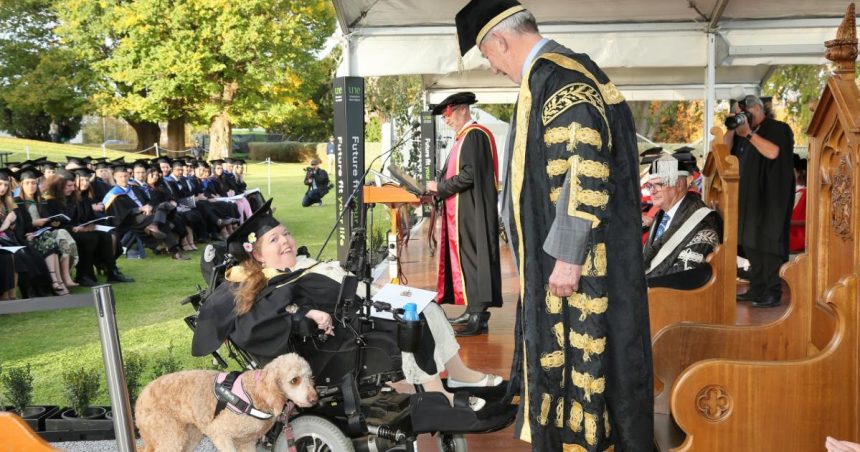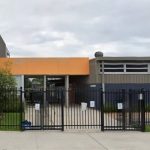When WA-based geoscience Honours student Eleanor Beidatsch headed to her graduation ceremony at the University of New England’s Armidale campus in regional New South Wales, it marked a journey of years of study – and more than 3,800 kilometres to travel across the Nullarbor to accept her First Class Honours testamur.
Ms Beidatsch first dreamt of a career in palaeontology as a primary school student but presumed her advanced physical disability – Spinal Muscular Atrophy (SMA) Type 1 – and use of a wheelchair would render “digging about in the dirt for fossils” impossible. However, a chance meeting on the opal fields of Lightning Ridge with one of UNE’s dinosaur experts, Dr Phil Bell, changed the course of her career.
By this stage she was studying marine biology as “a happy compromise”, but when she discovered that all UNE’s palaeontology units were offered online, she quickly added a few subjects to her existing study load. Then things took another turn when she discovered that UNE’s Dr Marissa Betts had an Honours project in the offing on the history of Cambrian “velvet worms”.
Over the next two years, supervised by Dr Betts and Dr Nicolas Campione, Ms Beidatsch mastered the use of sophisticated statistical software to identify species from high-quality images – all from the comfort of her home in Mount Barker, WA.
Her drive across the Nullarbor Plain was undertaken with her mother Karen, sister Kirsten, two support workers and two dogs (pet Oscar and assistance dog Button) in two vehicles kitted out for camping.
“It ended up being a big deal but I wouldn’t have missed the graduation ceremony for the world,” says Ms Beidatsch, whose reliance on a powered wheelchair and ventilator prevents her from flying comfortably.
“It’s the culmination of a very supportive and positive studying experience. UNE has an accessible and inclusive approach to learning, which has enabled me to succeed.
“I am very proud of myself for finishing, because it has largely been a solo academic journey. I have had no other students with a disability to interact with, but I have shown that students like me can not only study at university but study this inherently physical discipline.”
Scholarship helps elevate ongoing tertiary studies
Highlights of her palaeontology studies in 2023 included attending the Palaeo Down Under Conference and field trip (with help from the UNE Advancement Fund), as well as the Australian Earth Science Conference, where she presented on studying science as someone with a disability.
“I am pleased that my results might potentially lead to an extension of our knowledge of the species (Microdictyon sinicum) and alternative methods for measuring and analysing fossils from that era,” Ms Beidatsch says of the new online databases, software and technologies she used to answer palaeontological questions.
And that questioning is not over yet, with hopes to begin her Master’s at UNE later this year – supported by a $130,000 Elevate scholarship from the Australian Academy of Technological Sciences and Engineering.
“I don’t like being idle and I’m also determined to get my PhD, so I want to become really good at research in this area,” she says. “Even though my disability is not terminal, SMA is a degenerative condition, and I don’t want to waste any time. There are things I want to achieve and experience while I am still physically able to.”
A $130,000 Elevate scholarship from the Australian Academy of Technological Sciences and Engineering will support her postgraduate studies.








